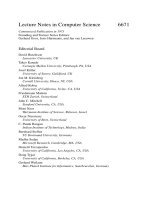Random Signals for Communications and Signal Processing
Bạn đang xem bản rút gọn của tài liệu. Xem và tải ngay bản đầy đủ của tài liệu tại đây (76.93 KB, 4 trang )
Random Signals for
Communications and
Signal Processing
Pham Van Tuan
Electronic & Telecommunication Engineering
Danang University of Technology
Course Administration
! The prerequisite of this course:
" Linear Systems Theory in Discrete and Continuous Time
" Basic Signals in Discrete and Continuous Time
" Differential and Integral Calculus
" Principles of Engineering Statistics
" Principles of Probability
" Facility with MATLAB
! Goals:
" To learn the techniques of applied probability and statistical signal
processing and apply to communication and signal processing.
! Credits: 5
! Grading: hw (20%); lab (20%); midterm (20%); final exam (30%); final
project (10%)
! Contents:
" Discrete-Time Random Process
" Signal Modeling
" Wiener Filters
" Spectrum Estimation
" Adaptive Filters
" Applications in Communications and Signal Processing
! Textbook:
" M. H. Hayes, Statistical Digital Signal Processing and Modeling,
John Wiley, 1996.
" John A. Gubner, Probability and Random Processes for Electrical
and Computer Engineering, Cambridge Uni. Press, 2006
" Peter Vary, Digital Speech Transmission, Wiley, 2006.
! Course reference:
" Alle-Jan van der Veen and Geert Leus, ET4235: DIGITAL
SIGNAL PROCESSING, 2011.
Course Materials
! At the end of this course, students will be able to:
" Calculate the probability of combinations of events using hand and
computer analysis.
" Write computer (MATLAB) programs to compute many probability
distributions.
" Solve for the distributions of random variable arising from certain
functions of random variables.
" Model datasets arising in communications using common
probabilistic models.
" Analyze the effect of randomness on communication signals.
" Model and analyze the linear systems using multivariate Gaussian
distributions.
" Design statistical signal processing systems for communications
applications.
Learning Objectives









